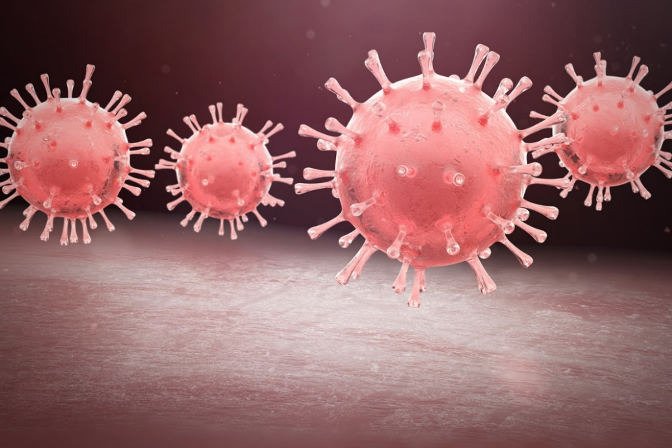Blueberry Therapeutics is a drug development company committed to finding new and improved treatments for a range of dermatological conditions affecting the skin and nails. The future and long‑term effect of the global COVID-19 pandemic (caused by severe acute respiratory syndrome coronavirus 2 [SARS-CoV-2 virus]) on dermatology practice and skin health is still unknown, but here we provide some insights on the potential challenges for dermatology patients and practitioners.
Skin diseases are frequently neglected as they are not an immediate threat to life, and do not generally cause serious complications or require hospitalisations. Lockdown and other measures implemented in many countries to reduce the spread of SARS-CoV-2 infections and protect people and healthcare resources, have led to a notable decrease in the number of patients attending face-to-face outpatient dermatology consultations, both in hospitals and in specialist clinics1,2. Although teledermatology appointments (using telecommunication technology) have been recommended and successfully implemented to allow consultations3, there is concern of a build-up of undiagnosed and untreated skin conditions. These may become more burdensome and some cases may require urgent medical attention if patients continue to be unable to seek help. Some inflammatory skin diseases, such as psoriasis or atopic dermatitis, are treated with systemic immunosuppressive drugs, which reach the bloodstream and affect the bodies capacity to fight off an infection4. In this COVID‑19 era, patients under treatment with these drugs that work through the modulation of the immune system should be monitored closely, so appointments with their dermatologist are important.
As well as this potential issue of under-diagnosis and undertreatment, there may be a delay in new treatments being approved and available for use. Many clinical trials that were ongoing for novel treatments have had to be halted, due to the difficulties in patients safely attending visits at trial sites. Although COVID-19 guidelines on running clinical trials offer options to keep trials going, such as delivery of the study drug direct to the patient and online study visits and safety follow-up5, in practice these changes have perhaps been implemented more readily in trials in urgent, life-threatening diseases such as cancer, than in the non-cancer related skin diseases.
Our skin is the biggest human organ, is our first line of defence against microbial attacks, and requires careful attention and care. Due to COVID-19, healthcare workers are having to wear more personal protective equipment (PPE) (masks, gloves, goggles, rubber boots and shoes) for prolonged periods of time, and this is causing skin issues in susceptible people. These include skin injury, skin maceration (whitening and wrinkling of the skin), fungal infections, eczema (inflammatory condition with itchiness, red skin and a rash), allergic reactions or acne. Increased handwashing/use of skin disinfectants (for example, 70% ethanol) can potentially cause allergic or irritant contact dermatitis (inflammatory reaction to direct contact with toxic agents)6. The British Association of Dermatologists provides advice on minimising the impact of frequent handwashing on the skin, which includes using soap and water, patting hands dry rather than rubbing, using moisturisers (emollients) after washing, overnight moisturising treatment with cotton gloves where needed, and using protective gloves when exposed to detergents/shampoos etc7.
In addition to these reactions directly related to PPE and hand sanitisation, growing evidence suggests there are specific symptoms of COVID-19 that manifest in the skin. A recent review of published data from 24 studies showed that acral lesions (lesions on the extremities), urticarial rashes (nettle rash or hives), vesicular rashes (blister-like), erythematous maculopapular rashes (flat, red with small bumps), livedo/purpura/necrosis (impaired circulation leading to blotchy red/blue colour), and erythema multiforme-like eruptions (immune reactions, red, raised patches) have all been reported in COVID-19 patients8. These skin reactions are not currently on the list of most common COVID-19 symptoms described by the World Health Organisation (WHO)9 and alone would not warrant a swab test for SARS‑CoV-2, but increased awareness of these less frequent symptoms may help identify potential SARS‑CoV-2 infections and protect you, your family/friends, and your community.
It is clear that the COVID-19 pandemic has far-reaching effects on all of us, on patients with skin diseases and on dermatology practice. COVID-19 is not a disease of skin, but we have all some skin in the game.
Written by Juergen Dobmeyer (Chief Medical Officer) and Emma Leigh (Medical Writing Lead)
Sources:
[1] Kutlu O, Günes R, Coerdt K et al. The effect of the “stay-at-home” policy on requests for dermatology outpatient clinic visits after the COVID-19 outbreak. Dermatologic Therapy 2020 May 13; e13581. doi: 10.1111/dth.13581. Online ahead of print.
[2] Gisondi P, Piaserico S, Conti A, Naldi L. Dermatologists and SARS-CoV-2: The impact of the pandemic on daily practice. J Eur Acad Dermatol Venereol 2020;34(6):1196-1201.
[3] British Association of Dermatology. COVID-19: clinical guidelines for the management of dermatology patients remotely. Published 17 June 2020. https://www.bad.org.uk/healthcare-professionals/covid-19/remote-dermatology-guidance.
[4] Schwartz RA, Pradhan S, Murrell DF et al. COVID-19 and immunosuppressive therapy in dermatology. Dermatol Ther 2020 Aug 7;e14140. doi: 10.1111/dth.14140. Online ahead of print.
[5] EC guidance on the management of clinical trials during the COVID-19 (coronavirus) pandemic. Version 3, 29 April 2020. https://ec.europa.eu/health/sites/health/files/files/eudralex/vol-10/guidanceclinicaltrials_covid19_en.pdf
[6] Long H, Zhao H, Chen A et al. Protecting medical staff from skin injury/disease caused by personal protective equipment during epidemic period of COVID-19: experience from China. J Eur Acad Dermatol Venereol 2020;34(5):919–921.
[7] British Association of Dermatologists. Statement on dry skin and frequent handwashing to reduce COVID-19 risk. https://www.skinhealthinfo.org.uk/statement-on-coronavirus-and-skin-disease-affecting-the-hands/
[8] Daneshgaran G, Dubin DP, Gould DJ. Cutaneous manifestations of COVID‑19: An evidence‑based review. Am J of Clin Dermatol 2020;21(5):627-639.
[9] Word Health Organization coronavirus symptoms. https://www.who.int/health-topics/coronavirus#tab=tab_3

